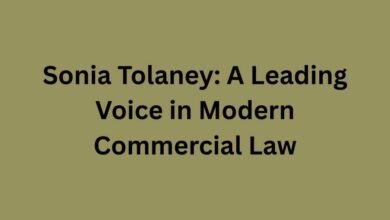Jonathan Gaisman: A Master of the Commercial Bar and Cultural Commentator

In the world of law and advocacy, few names command as much respect as Jonathan Gaisman. Known as one of the most formidable advocates in the United Kingdom, he has established himself as a King’s Counsel of remarkable intellect, persuasive skill, and strategic brilliance. His influence, however, extends far beyond the courtroom. Gaisman is also an accomplished essayist and commentator on music, philosophy, literature, and religion. This dual career gives him a distinctive position as both a practitioner of the law at its highest level and a cultural thinker deeply engaged in intellectual debate.
Early Career and Rise to King’s Counsel
Jonathan Gaisman’s career began with a foundation in traditional legal practice, rooted in intellectual precision and a dedication to detail. His early years were marked by involvement in significant cases that required not just legal reasoning but also a grasp of financial structures, insurance mechanisms, and professional responsibility.
From the outset, he displayed qualities that would later become his hallmark: analytical sharpness, relentless cross-examination, and a style that combined elegance with devastating effect. He rose quickly through the ranks, gaining recognition for his mastery in handling long, complex trials that often stretched for months. His elevation to King’s Counsel cemented his reputation as one of the leading commercial barristers in the country.
Expertise in Commercial Litigation and Arbitration
Jonathan Gaisman specialises in commercial disputes of the highest order. His expertise includes professional negligence claims, financial services disputes, marine law, insurance law, and large-scale fraud cases. He is also a trusted advocate in international arbitration, where his capacity to untangle highly technical disputes has been repeatedly demonstrated.
Among his most notable cases are:
Barings v Deloitte – a high-profile matter concerning allegations of audit negligence.
Equitable Life v Ernst & Young – a landmark professional negligence dispute involving actuaries and auditors.
Buncefield explosion litigation – representing lead claimants against Total in one of the UK’s most significant industrial disasters.
The Kriti Palm case – a Court of Appeal matter concerning the definition of fraud in English law.
These examples show his ability to handle disputes that blend financial complexity with legal intricacy, making him a preferred choice for clients facing high-stakes litigation.
Style and Reputation at the Bar
At the Commercial Bar, Jonathan Gaisman is not merely regarded as competent—he is revered. Colleagues, clients, and judges alike have described him as “unquestionably the best advocate at the Commercial Bar.” His reputation is built not only on intellectual firepower but also on his ability to dominate the courtroom through clarity, authority, and precision.
One of his strongest qualities is his cross-examination. He has been described as “devastatingly brutal,” capable of dismantling opposing witnesses with a combination of logic, persistence, and psychological insight. Yet, his style remains rooted in professional dignity. Unlike advocates who rely on aggression, Gaisman’s strength lies in his ability to turn complex arguments into simple, unassailable conclusions.
Endurance in Long Trials
A hallmark of Jonathan Gaisman’s career has been his resilience in long trials and hearings. He has led cases lasting more than 80 days, involving teams of accountants, actuaries, and financial experts. He also appeared in disciplinary hearings against leading firms such as Ernst & Young, which stretched over two months.
This stamina is not merely physical but intellectual. He has an ability to retain the entire architecture of a case in his mind, weaving together fine detail with broad strategy. Such endurance makes him indispensable in disputes where the outcome may hinge on sustained advocacy across weeks or months.
Recognition and Rankings
Legal directories consistently rank Jonathan Gaisman at the very top of the profession. He is a Band 1 barrister in Fraud: Civil and Commercial Dispute Resolution. He is recognised as a leading authority in cases involving high-value fraud, complex financial structures, and professional negligence.
His rankings extend into areas such as energy and natural resources and marine law, reflecting his breadth of practice. These accolades are not mere formalities but a reflection of consistent excellence across decades of practice.
Beyond the Courtroom: The Writer and Thinker
What makes Jonathan Gaisman truly exceptional is that his talents are not confined to the courtroom. Alongside his legal work, he is an accomplished writer and commentator. His essays cover a range of topics including classical music, philosophy, theology, and literature.
He has written extensively about the works of composers such as Bach, Brahms, Wagner, and Schumann, offering profound insights into their music. His essay on Bach’s Art of Fugue, for instance, shows the same analytical depth that he brings to the law, interpreting music not only as art but as a philosophical expression.
In the field of philosophy and religion, Gaisman explores themes such as the role of evidence in faith, the tension between scepticism and belief, and the meaning of devotion in a modern world. These writings demonstrate his ability to think beyond the material and engage with questions of truth, morality, and human experience.
He has also written cultural pieces about places such as Transylvania, reflecting on history, architecture, and tradition. This versatility demonstrates that his intellectual pursuits are not limited to a single discipline.
The Intersection of Law and Culture
It is tempting to see Jonathan Gaisman’s dual career as lawyer and essayist as separate. Yet they are deeply connected. His legal work requires rigour, attention to language, and the ability to analyse human motives under pressure. His cultural writings require sensitivity, breadth of thought, and imagination.
Together, these two strands make him a rare figure: a man of action and reflection, of intellect and artistry. In court, he is an advocate of unmatched clarity; in writing, he is a commentator who bridges the gap between the technical and the human.
Influence on the Next Generation
Jonathan Gaisman’s influence extends to younger barristers who look to him as a model of advocacy. His method—precise, fearless, and ethical—sets a benchmark for how complex commercial litigation should be conducted.
He also embodies the idea that legal professionals need not confine themselves to a narrow world of law. His example shows that an advocate can also be a thinker, a writer, and a cultural critic. This breadth of vision is increasingly rare in an age of specialisation, making his career all the more inspiring.
Conclusion
The name Jonathan Gaisman stands for excellence, endurance, and intellectual depth. In the courtroom, he has shaped the outcomes of some of the most complex and high-value disputes of recent decades. In the world of ideas, he has written essays that illuminate art, music, and faith with originality and elegance.
His career demonstrates that law is not merely a technical exercise but also a human pursuit, one that requires clarity, moral strength, and imagination. At the same time, his writing proves that intellectual life is richer when informed by experience at the highest level of practice.



